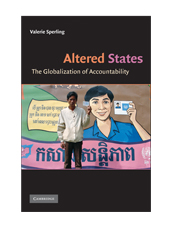
-
Select format
-
- Publisher:
- Cambridge University Press
- Publication date:
- 19 January 2010
- 25 May 2009
- ISBN:
- 9780511609824
- 9780521834001
- 9780521541817
- Dimensions:
- (234 x 156 mm)
- Weight & Pages:
- 0.67kg, 396 Pages
- Dimensions:
- (234 x 156 mm)
- Weight & Pages:
- 0.55kg, 396 Pages
You may already have access via personal or institutional login
Book description
Is globalization good for democracy? Or has it made our governing institutions less accountable to citizens? Located at the intersection of international relations and comparative politics, this book explores the effects of globalization on national governance. Under what circumstances do the transnational forces that embody globalization encourage or discourage political accountability? Among the transnational forces discussed in the book are the International Monetary Fund, the World Bank, multinational corporations, the United Nations, private military contractors, peacekeepers, the European Court of Human Rights, and several transnational social movements. Using in-depth case studies of situations in which these transnational institutions interact with national governments and citizens, Valerie Sperling traces the impact of economic, political, military, judicial, and civic globalization on state accountability and investigates the degree to which transnational institutions are themselves responsible to the people whose lives they alter.
Awards
Joint winner of the Chadwick Alger Prize 2010
Reviews
'Altered States is an excellent book that is broad ranging and provides a rich store of insights on crucial aspects of globalization that are rarely addressed in depth with this level of flair. It is gracefully written and full of incisive points on the big issues it tackles. The book is timely and will find a wide audience in political science, sociology, and the broader attentive public outside academia.'
Steven Fish - University of California, Berkeley
'Valerie Sperling tackles a question which lies at the heart of contemporary concerns about globalization in its various political, economic, military, and cultural guises: namely, just how can elites be held accountable for their actions in a world where the locus of authority seems to have shifted away from nation-states toward a shifting array of international agencies, INGOs, and other non-state actors? If accountability cannot be defined or defended in an increasingly globalized world, then the recent gains for global democracy may also be eroded or reversed. Sperling not only brings this crucial problem to the forefront of attention, but she also conducts careful empirical, comparative social science research into the circumstances under which various aspects of globalization facilitate or undermine accountability. The result is a book that will profoundly reshape multiple intellectual debates.'
Stephen Hanson - University of Washington
'At a time of world crisis, policymakers and scholars are perplexed about accountability in globalization. To grasp sources of global democracy, they should turn to Valerie Sperling's meticulously researched and lucidly presented book.'
James H. Mittelman - University Professor at American University and author of Hyperconflict: Globalization and Insecurity (2010)
'Sperling should be applauded for her detailed research and for refusing to reduce the phenomena to simple theories or sound bites.'
Source: The Review of Politics
Contents
Metrics
Full text views
Full text views help Loading metrics...
Loading metrics...
* Views captured on Cambridge Core between #date#. This data will be updated every 24 hours.
Usage data cannot currently be displayed.
Accessibility standard: Unknown
Why this information is here
This section outlines the accessibility features of this content - including support for screen readers, full keyboard navigation and high-contrast display options. This may not be relevant for you.
Accessibility Information
Accessibility compliance for the HTML of this book is currently unknown and may be updated in the future.


